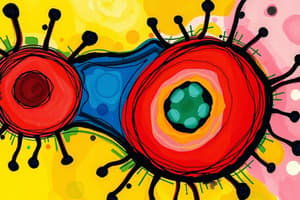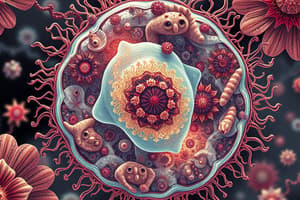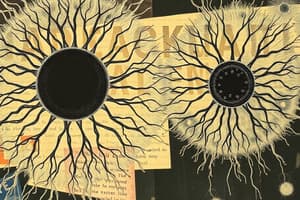Podcast
Questions and Answers
What is the primary function of lysosomes in a cell?
What is the primary function of lysosomes in a cell?
- To synthesize proteins and lipids
- To store nutrients and waste products
- To break down waste materials and cellular debris (correct)
- To maintain turgor pressure in plant cells
What is the primary function of the nucleus in a cell?
What is the primary function of the nucleus in a cell?
- To synthesize proteins and lipids
- To generate energy for the cell
- To transport molecules within the cell
- To direct all cell activities, including growth, metabolism, and reproduction (correct)
What is the main difference between rough and smooth endoplasmic reticulum?
What is the main difference between rough and smooth endoplasmic reticulum?
- Rough ER is involved in protein synthesis, while smooth ER is involved in lipid synthesis (correct)
- Rough ER is involved in lipid synthesis, while smooth ER is involved in protein synthesis
- Rough ER is involved in protein synthesis, while smooth ER is involved in detoxification
- Rough ER is involved in detoxification, while smooth ER is involved in protein synthesis
Which organelle is responsible for converting sunlight into chemical energy in plant cells?
Which organelle is responsible for converting sunlight into chemical energy in plant cells?
What is the function of the cell wall in plant cells?
What is the function of the cell wall in plant cells?
What is the primary function of the mitochondria in a cell?
What is the primary function of the mitochondria in a cell?
What is the role of the cytoplasm in a cell?
What is the role of the cytoplasm in a cell?
What is the function of vacuoles in plant cells?
What is the function of vacuoles in plant cells?
What is the primary function of the Golgi apparatus in a cell?
What is the primary function of the Golgi apparatus in a cell?
What is the primary function of the cell membrane?
What is the primary function of the cell membrane?
What is the analogy used to describe the function of the cell membrane?
What is the analogy used to describe the function of the cell membrane?
Which type of cells are categorized based on how the genetic material is placed in the cell?
Which type of cells are categorized based on how the genetic material is placed in the cell?
What is the name of the pigment that captures light energy in chloroplasts?
What is the name of the pigment that captures light energy in chloroplasts?
What is the function of the endoplasmic reticulum in a cell?
What is the function of the endoplasmic reticulum in a cell?
What is the basic unit of life that can only be seen with a microscope?
What is the basic unit of life that can only be seen with a microscope?
What is the characteristic of the cell membrane?
What is the characteristic of the cell membrane?
Flashcards are hidden until you start studying
Study Notes
Cellular Composition
- Every living thing is composed of cells, which are the smallest unit of life and can only be seen with a microscope.
Cell Classification
- Cells are divided into two categories: prokaryotic cells (single-cell organisms) and eukaryotic cells (based on genetic material placement).
Eukaryotic Cells
- There are two types of eukaryotic cells: Animal Cells and Plant Cells.
Organelles in a Cell
- The nucleus is the control center of the cell, containing DNA, which holds instructions for making proteins and other molecules.
- The nucleus directs all cell activities, including growth, metabolism, and reproduction.
- Mitochondria are the powerhouses of the cell, producing energy by converting glucose and oxygen into ATP.
- The Golgi apparatus processes and packages proteins and lipids, and is involved in their transport within the cell and to the cell membrane.
- Chloroplasts (found only in plant cells) are responsible for photosynthesis, converting sunlight into chemical energy stored in glucose.
- The cell membrane controls what enters and exits the cell, maintaining the internal environment by allowing nutrients in and waste products out.
- Lysosomes contain enzymes that break down waste materials and cellular debris, and are the cell's recycling center.
- Vacuoles are storage bubbles found in cells, storing nutrients, waste products, and other substances.
- The cytoplasm is a jelly-like substance that fills the cell, providing a medium for chemical reactions to occur and helping maintain the cell's shape.
- The endoplasmic reticulum (ER) is a network of membranes involved in protein and lipid synthesis, with two types: Rough ER (with ribosomes) and Smooth ER.
- The cell wall (found only in plant cells) provides structure and support to the cell, offering protection and giving the cell its shape.
Studying That Suits You
Use AI to generate personalized quizzes and flashcards to suit your learning preferences.




